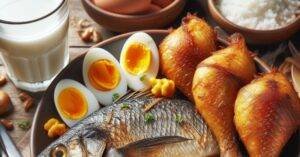
Table of Contents
The Pineapple, which is also called Ananas comosus is very rich in lots of nutrients your body needs daily. A whole pineapple fruit of 905g gives you 452kcal of energy, 4.89g of protein, 119g of carbohydrates, 12.7g of dietary fiber, 118mg of calcium, 2.62mg of Iron, 49.8mg of choline and so much more.
The pineapple skin can also be used to make animal skin, vinegar, and alcohol. In this article, we’ll take a look at the pineapple nutrition data you need to be aware of including the possible risks to its consumption.
Nutrition facts for 1 whole fruit of a pineapple.
|
Nutrition facts for one whole pineapple fruit of 905g. | |||
| Nutrient | Amount | Minimum | Maximum |
|
Water |
778g |
747g |
829g |
|
Energy |
452Kcal |
– |
– |
|
Protein |
4.89g |
2.72g |
6.7g |
|
Total lipid(fat) |
1.09g |
0.453g |
1.81g |
|
Ash |
1.99g |
0.453g |
3.35g |
|
Carbohydrate |
119g |
– |
– |
|
Total dietary fiber |
12.7g |
10.9g |
13.6g |
|
Total sugars including NLEA |
89.1g |
62.4g |
103g |
|
Calcium |
118mg |
54.3mg |
172mg |
|
Iron |
2.62mg |
1.18mg |
4.89mg |
|
Magnesium |
109mg |
81.4mg |
217mg |
|
Phosphorus |
72.4mg |
45.2mg |
154mg |
|
Potassium |
986mg |
733mg |
1470mg |
|
Sodium |
9.05mg |
– |
– |
|
Zinc |
1.09mg |
0.362mg |
1.36mg |
|
copper |
0.996mg |
0.353mg |
1.75mg |
|
Manganese |
8.39mg |
1.12mg |
37.7mg |
Nutrient | Amount | Minimum | Maximum |
|
Selenium |
0.905µg |
0µg |
0.905µg |
|
Vitamin C |
433mg |
71.5mg |
640mg |
|
Thiamine |
0.715mg |
0.552mg |
1.01mg |
|
Riboflavin |
0.29mg |
0.091mg |
0.471mg |
|
Niacin |
4.52mg |
1.54mg |
13.5mg |
|
Pantothenic acid |
1.93mg |
0.453mg |
4.11mg |
|
Vitamin B-6 |
1.01mg |
0.742mg |
1.37mg |
|
Total Folate |
163µg |
72.4µg |
326µg |
|
Total Choline |
49.8mg |
— |
– |
|
Betaine |
0.905mg |
0.905mg |
0.905mg |
|
Vitamin A, RAE |
27.2µg |
9.05µg |
36.2µg |
|
Carotene, beta |
317µg |
154µg |
452µg |
|
Vitamin A, IU |
525 IU |
253 IU |
751 IU |
|
Vitamin E (alpha-tocopherol) |
0.181mg |
0.181mg |
0.272mg |
|
Vitamin K (phylloquinone) |
6.34µg |
1.81µg |
10.9µg |
|
Total saturated fatty acids |
0.081g |
– |
– |
|
Total monounsaturated fatty acids |
0.118g |
– |
– |
|
Total polyunsaturated fatty acids |
0.362g |
– |
– |
As shown in the table above on the pineapple nutrition data for one whole fruit, pineapples are very rich in nutrients such as:
Vitamins: These include vitamins A, C, K, Thiamine, Niacin, Riboflavin, and several others which play very important roles in many physiological processes in the body that keep you healthy and strong.
Carbohydrates: The fruit contains up to 119g of carbs which is a source of energy for your activities of daily living. It has a medium glycemic index so can be eaten by diabetics but in moderation.
Proteins: It’s not a great source of protein. Whole fruit contains about 4.9g which may not be so significant but still adds towards reaching your daily value in some way.
Fats: Just like most other fruits, it has a low-fat content making it ideal for a low-fat diet.
Minerals: Minerals are essential for normal bodily functions and biological processes. The pineapple is a reliable source of these elements such as magnesium, manganese, iron, Zinc, Calcium, etc.
Nutrition facts for pineapple chunks.
Below is the pineapple nutrition data for one-cup, chunks.
|
Nutrition facts for pineapple chunks of 165g. | ||||
| Nutrient | Unit | Amount | Minimum | Maximum |
|
Water |
g |
142 |
136 |
151 |
|
Energy |
Kcal |
82.5 |
– |
– |
|
Protein |
g |
0.891 |
0.495 |
1.22 |
|
Total lipid(fat) |
g |
0.198 |
0.083 |
0.33 |
|
Ash |
g |
0.363 |
0.083 |
0.61 |
|
Carbohydrate |
g |
21.6 |
– |
– |
|
Total dietary fiber |
g |
2.31 |
1.98 |
2.48 |
|
Total sugars including NLEA |
g |
16.3 |
11.4 |
18.8 |
|
Calcium |
mg |
21.4 |
9.9 |
31.4 |
|
Iron |
mg |
0.478 |
0.214 |
0.891 |
|
Magnesium |
mg |
19.8 |
14.8 |
39.6 |
|
Phosphorus |
mg |
13.2 |
8.25 |
28 |
|
Potassium |
mg |
180 |
134 |
267 |
|
Sodium |
mg |
1.65 |
– |
– |
|
Zinc |
mg |
0.198 |
0.066 |
0.247 |
|
copper |
mg |
0.181 |
0.064 |
0.318 |
|
Manganese |
mg |
1.53 |
0.205 |
6.88 |
|
Selenium |
µg |
0.165 |
0 |
0.165 |
|
Vitamin C |
mg |
78.9 |
13 |
117 |
|
Thiamine |
mg |
0.13 |
0.101 |
0.185 |
|
Riboflavin |
mg |
0.053 |
0.017 |
0.086 |
|
Niacin |
mg |
0.825 |
0.281 |
2.46 |
|
Pantothenic acid |
mg |
0.351 |
0.083 |
0.749 |
|
Vitamin B-6 |
mg |
0.185 |
0.135 |
0.249 |
|
Total Folate |
µg |
29.7 |
13.2 |
59.4 |
|
Total Choline |
mg |
9.08 |
— |
– |
|
Betaine |
mg |
0.165 |
0.165 |
0.165 |
|
Vitamin A, RAE |
µg |
4.95 |
1.65 |
6.6 |
|
Carotene, beta |
µg |
57.8 |
28 |
82.5 |
|
Vitamin A, IU |
IU |
95.7 |
46.2 |
137 |
|
Vitamin E (alpha-tocopherol) |
mg |
0.033 |
0.033 |
0.049 |
|
Vitamin K (phylloquinone) |
µg |
1.16 |
0.33 |
1.98 |
|
Total saturated fatty acids |
g |
0.015 |
– |
– |
|
Total monounsaturated fatty acids |
g |
0.021 |
– |
– |
|
Total polyunsaturated fatty acids |
g |
0.066 |
– |
– |
Nutrition facts for pineapple juice.
Below is the pineapple nutrition data for 1 cup of pineapple juice measuring 250g.
|
Nutrition facts for 1 cup of pineapple juice, 250g. | ||||
|
Nutrient |
Unit |
Amount |
Minimum |
Maximum |
|
Water |
g |
216 |
214 |
218 |
|
Energy |
Kcal |
132 |
– |
– |
|
Protein |
g |
0.9 |
0.575 |
1.02 |
|
Total lipid(fat) |
g |
0.3 |
0 |
0.475 |
|
Ash |
g |
0.7 |
0.65 |
0.75 |
|
Carbohydrate |
g |
32.2 |
– |
– |
|
Total dietary fiber |
g |
0.5 |
– |
– |
|
Total sugars including NLEA |
g |
25 |
– |
– |
|
Calcium |
mg |
32.5 |
17.5 |
60 |
|
Iron |
mg |
0.775 |
0.425 |
1.42 |
|
Magnesium |
mg |
30 |
27.5 |
37.5 |
|
Phosphorus |
mg |
20 |
15 |
22.5 |
|
Potassium |
mg |
325 |
212 |
400 |
|
Sodium |
mg |
5 |
0 |
12.5 |
|
Zinc |
mg |
0.275 |
0.225 |
0.325 |
|
copper |
mg |
0.173 |
0.07 |
0.325 |
|
Manganese |
mg |
1.26 |
– |
– |
|
Selenium |
µg |
0.25 |
– |
– |
|
Fluoride |
µg |
13.8 |
2.25 |
38.5 |
|
Vitamin C |
mg |
110 |
– |
– |
|
Thiamine |
mg |
0.145 |
0.11 |
0.205 |
|
Riboflavin |
mg |
0.053 |
0.03 |
0.1 |
|
Niacin |
mg |
0.498 |
0.045 |
1 |
|
Pantothenic acid |
mg |
0.14 |
– |
– |
|
Vitamin B-6 |
mg |
0.25 |
– |
– |
|
Total Folate |
µg |
45 |
30 |
65 |
|
Total Choline |
mg |
8.25 |
– |
– |
|
Vitamin A, RAE |
µg |
0 |
– |
– |
|
Carotene, beta |
µg |
7.5 |
– |
– |
|
Vitamin A, IU |
IU |
12.5 |
0 |
162 |
|
Vitamin E (alpha-tocopherol) |
mg |
0.05 |
– |
– |
|
Vitamin K (phylloquinone) |
µg |
0.75 |
– |
– |
|
Total saturated fatty acids |
g |
0.02 |
– |
– |
|
Total monounsaturated fatty acids |
g |
0.035 |
– |
– |
|
Total polyunsaturated fatty acids |
g |
0.105 |
– |
– |
Nutrition facts for pineapple matcha Starbucks.
|
Nutrition facts for pineapple matcha Starbucks of 16 fl oz. | |||
|
Nutrient |
Unit |
Amount |
% daily value |
|
Energy |
Kcal |
170 |
– |
|
Protein |
g |
2 | |
|
Total lipid(fat) |
g |
5 |
6% |
|
Saturated fat |
g |
4.5 |
23% |
|
Carbohydrate |
g |
30 |
11% |
|
Dietary fiber |
g |
2 |
7% |
|
Sugars |
g |
27 |
– |
|
Caffeine |
mg |
80 |
– |
|
Sodium |
mg |
115 |
5% |
Nutrition facts for pineapple upside-down cake.
|
Nutrition facts for 1 piece of pineapple upside-down cake of 115g. | ||
|
Nutrient |
Unit |
Amount |
|
Water |
g |
37.1 |
|
Energy |
Kcal |
367 |
|
Protein |
g |
4.02 |
|
Total lipid(fat) |
g |
13.9 |
|
Ash |
g |
1.96 |
|
Carbohydrate |
g |
58.1 |
|
Total dietary fiber |
g |
0.92 |
|
Calcium |
mg |
138 |
|
Iron |
mg |
1.7 |
|
Magnesium |
mg |
15 |
|
Phosphorus |
mg |
94.3 |
|
Potassium |
mg |
129 |
|
Sodium |
mg |
367 |
|
Zinc |
mg |
0.356 |
|
copper |
mg |
0.1 |
|
Manganese |
mg |
0.402 |
Nutrient | Unit | Amount |
|
Selenium |
µg |
10.8 |
|
Vitamin C |
mg |
1.38 |
|
Thiamine |
mg |
0.176 |
|
Riboflavin |
mg |
0.179 |
|
Niacin |
mg |
1.37 |
|
Pantothenic acid |
mg |
0.232 |
|
Vitamin B-6 |
mg |
0.039 |
|
Total Folate |
µg |
29.9 |
|
Vitamin B-12 |
µg |
0.092 |
|
Vitamin A, RAE |
µg |
71.3 |
|
Vitamin A, IU |
IU |
291 |
|
Total saturated fatty acids |
g |
3.36 |
|
Total monounsaturated fatty acids |
g |
5.97 |
|
Total polyunsaturated fatty acids |
g |
3.77 |
|
Cholesterol |
mg |
25.3 |
Pineapple Calories.
Pineapples are among the fruits with the lowest calories and are ideal for your weight loss program. A chunk of it weighing 165g has about 82.5 calories while a full slice of 56g only contains about 28 calories. They are also free from cholesterol and low in saturated fats which place them among the healthiest fruits you can have.
The exact amount of calories you get depends on the quantity you consume. Below is a table of the amount of pineapple calories you’ll get from different amounts of the fruit.
| Consumption form | Quantity or weight | Calories(Kcal) |
|---|---|---|
| Full fruit | 905g | 452 |
| Chunks | 165g | 82.5 |
| Juice | A cup of 250g | 132 |
| Matcha starbucks | 16 fl oz | 170 |
| Upside-down cake | 115g | 367 |
18 health benefits of pineapples.

1. A viable source of nutrients: Pineapples are reliable sources of various nutrients like minerals and vitamins. They are cholesterol-free, very low in saturated fats, and medium glycemic index.
2. Source of anti-oxidants: They are rich in flavonoids and phenolic compounds with proven antioxidant properties as discussed in the Journal of the National Library of Medicine.1 Manganese, one of the minerals found in pineapples also has antioxidant properties.
3. Reduced risk of cancer: Pineapples contain Bromelain, as published in the National Library of Medicine,2 which can not only prevent cancer but help treat ongoing cancerous tumors. Its fiber content is known to also reduce the risk of cancer.
A lot of other nutrients it contains, with anti-inflammatory and antioxidant properties, also help in the prevention of cancer.
4. Improved digestion: It contains more insoluble dietary fiber which plays a massive role in the digestion of foods and preventing constipation. Bromelain is also believed to possess the properties of enzymes in the digestion of food.
5. Immunity: The various vitamins in the fruit help boost your body’s defense against ailments and infections.
6. Weight loss assistance: It is low in calories in addition to the fiber content which makes you feel full. Feeling full helps you consume fewer calories. It is also believed to contain enzymes that may help in burning body fats as discussed in PubMed Central.3
7. Eases arthritis symptoms: The anti-inflammatory contents of pineapples, including Bromelain, help reduce the symptoms of arthritis-like pain and inflammation.
8. Reduced Inflammation: Bromelain is as potent as anti-inflammatory drugs and it has the added benefit of having no side effects. Other antioxidants in the fruit also contribute to its anti-inflammatory effect.
9. Bone health and prevention of osteoporosis: Manganese from pineapples helps build stronger and healthier bones, including the prevention of osteoporosis in the elderly.
10. Reduced risk of an intravenous blood clot: Internal blood clots are a major cause of death and various medical problems like stroke and heart attacks. Bromelain helps to reduce this incidence appreciably.
11. Gastrointestinal health: Polyphenols from pineapples are known to help grow essential microbiomes in the guts that maintain gut health and prevent chronic ailments.
12. Healing and repair: This is still about the one nutrient called Bromelain. It’s believed to aid in healing from injuries and the restoration of damaged tissues.
13. Dental Health: Pineapples are good sources of calcium and manganese which help to maintain healthy gums and strong teeth.
14. Anti-hypertensive: The fruit is rich in potassium. In people with hypertension, this element could help in the regulation and maintenance of lower blood pressure in a natural way.
15. Treatment for Acne, Pimples, and Black spots: Rubbing a slice of pineapple on your face and leaving it to dry for 5 minutes before washing it off may help in the removal of black spots over time. This also helps in the prevention of pimples.
Additionally, the vitamin C content, together with the antioxidants, can help in the treatment or prevention of acne.
16. Healthier hair: It has nutrients that promote the health of your hair follicles and keep your hair from falling. The vitamin C, Bromelain, and antioxidants found in the fruit also give you healthier and silkier hair.
17. Accelerated recovery post-surgery: The anti-inflammatory properties of bromelain contained in pineapples make it useful for accelerated healing and recovery from surgery.
18. Anti-aging: It has alpha-hydroxy that delays cell death. This, together with its rich antioxidant content helps it work against the aging process.
Keep in touch by signing up for our newsletter.
What does pineapple do for a woman?
As a woman you stand to gain from all of the above listed 18 health benefits of pineapples, from being a source of essential nutrients your body needs to its anti-aging properties. Taking some of these benefits from a feminine perspective, pineapples help to:
1. Reduce your risk of breast cancer or help fight an existing disease: Studies have revealed pineapple extract has a good cytotoxic effect on breast cancer cells.4 By this, it is understood they kill breast cancer cells and also inhibit their growth.5
2. Libido: As a known aphrodisiac, pineapples are believed to improve libido, sexual health, and performance.
3. Vaginal smell: What we eat has some effect on body fluids. To this end, the pineapple, with its strong taste and smell, is thought to improve the smell of the vaginal. However, this shouldn’t be taken as a panacea in handling foul odors resulting from infections and I don’t see it working that way. Diseases need to be treated.
4. Reduce the risk of cancer: Pineapples are a source of soluble and insoluble fibers. Several studies have shown dietary fibers may reduce the risk of Breast cancer,6 Ovarian cancer,7 and Endometrial cancers according to the American Journal of Clinical Nutrition.
4 benefits of pineapple sexually.
1. Male fertility: Pineapples are a rich source of manganese. One cup serving is believed to contain more than half your daily mineral requirement. Manganese is known to increase sperm motility and health which boosts fertility.
2. Libido: As has already been highlighted, pineapple has aphrodisiac properties by which it boosts sexual desires, stamina, and activities
3. Erectile dysfunction: Pineapples are a good source of polyphenols that help in the management of erectile dysfunction.8
4. Improvement of the efficacy of sexual drugs: The polyphenols in pineapples have also been found to improve the potency of drugs used in treating erectile dysfunction such as sildenafil(source).
The 4 risks to pineapple consumption.
1. Allergies: People allergic to some types of fruits may also be allergic to pineapples. Allergic reactions could include rashes, stomach pain, itchy skin, vomiting, diarrhea, and respiratory distress. It may be helpful to consult your doctor if you experience any of these reactions to know if the fruit is safe for you.
2. Undesirable effect of Bromelain: Bromelain is known to break down proteins so may leave you with sour lips or an itchy tongue.
3. Reaction to drugs: You may have to avoid pineapple if you are on certain medications like antibiotics and blood thinners.9 (source)
You’ll need to consult your healthcare provider for expert advice.
4. Added sugar: Diabetics are advised to eat pineapples in moderation as contained in the National Library of Medicine.10
Some jarred or canned pineapples may come with added sugars you have to be careful with. Rinsing the fruit may reduce the added sugar content.
I hope this provided some value. Leave a note on any areas of dissatisfaction or that need improvement. You may also be interested in the nutritional value of eggs, Pinto beans nutritional facts, Coca-Cola, or peanut butter.
- Lin, D., Xiao, M., Zhao, J., Li, Z., Xing, B., Li, X., Kong, M., Li, L., Zhang, Q., Liu, Y., Chen, H., Qin, W., Wu, H., & Chen, S. (2016). An Overview of Plant Phenolic Compounds and Their Importance in Human Nutrition and Management of Type 2 Diabetes. Molecules, 21(10). https://doi.org/10.3390/molecules21101374 ↩︎
- Debnath R, Majumder D, Nath P, Ghosh D, Maiti D. Bromelain plus peroxidase reduces non-Hodgkin lymphoma progression in invivo via up-regulation of antioxidant enzymes and modulating apoptotic protein expression. Nutr Cancer. 2020;72(7):1200-1210. doi: 10.1080/01635581.2019.1670217. Epub 2019 Oct 8. PMID: 31591915. ↩︎
- El-Shazly, S. A., Ahmed, M. M., AL-Harbi, M. S., Alkafafy, M. E., El-Sawy, H. B., & M. Amer, S. A. (2018). Physiological and molecular study on the anti-obesity effects of pineapple (Ananas comosus) juice in male Wistar rat. Food Science and Biotechnology, 27(5), 1429-1438. https://doi.org/10.1007/s10068-018-0378-1 ↩︎
- Fazane Raeisi, Elham Raeisi, Daryoush Shahbazi-Gahrouei, Esfandiyar Heidarian, Mohammad Amiri, Mostafa Gholami. (2016). Cytotoxicity Effect of Pineapple Extract on Breast Cancer Cells (4T1). Journal of Isfahan Medical School, Isfahan University of Medical Sciences. Volume 34, Issue 394 – Serial Number 394, Pages 946-951 ↩︎
- Haiyan, Shu; Funing, Ma; Keming, Li; Wei, Sun; Guiying, Xu; Rulin, Zhan; Shenghe, Chang. (2020). Growth of Breast Cancer Cells Inhibited by Bromelains Extracted from the Different Tissues of Pineapple. Institute of Systematics and Evolution of Animals, Polish Academy of Sciences. Volume 68, Number 3, pp. 81-88(8). https://doi.org/10.3409/fb_68-3.10 ↩︎
- Shankar, S., & Lanza, E. (1991). Dietary Fiber and Cancer Prevention. Hematology/Oncology Clinics of North America, 5(1), 25-41. https://doi.org/10.1016/S0889-8588(18)30452-0 ↩︎
- Xu, H., Ding, Y., Xin, X., Wang, W., & Zhang, D. (2018). Dietary fiber intake is associated with a reduced risk of ovarian cancer: A dose-response meta-analysis. Nutrition Research, 57, 1-11. https://doi.org/10.1016/j.nutres.2018.04.011 ↩︎
- Eleazu, C., Obianuju, N., Eleazu, K., & Kalu, W. (2017). The role of dietary polyphenols in the management of erectile dysfunction–Mechanisms of action. Biomedicine & Pharmacotherapy, 88, 644-652. https://doi.org/10.1016/j.biopha.2017.01.125 ↩︎
- Kaur H, Corscadden K, Lott C, Elbatarny HS, Othman M. Bromelain has paradoxical effects on blood coagulability: a study using thromboelastography. Blood Coagul Fibrinolysis. 2016 Oct;27(7):745-752. doi: 10.1097/MBC.0000000000000244. PMID: 25517253. ↩︎
- Anusha MB, Shivanna N, Kumar GP, Anilakumar KR. Efficiency of selected food ingredients on protein efficiency ratio, glycemic index and in vitro digestive properties. J Food Sci Technol. 2018 May;55(5):1913-1921. doi: 10.1007/s13197-018-3109-y. Epub 2018 Mar 14. PMID: 29666544; PMCID: PMC5897315. ↩︎





